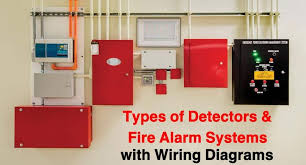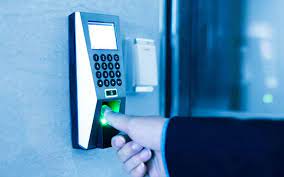Fire alarm systems are an essential part of any building’s safety infrastructure. They are designed to detect and alert occupants of a building in case of a fire emergency. Fire alarm systems are crucial in ensuring the safety of people and property, as they provide early warning and allow for quick evacuation.
There are different types of fire alarm systems available in the market, ranging from simple smoke detectors to complex addressable systems. Smoke detectors are the most common type of fire alarm system, which detect smoke particles in the air and trigger an alarm when smoke is detected. Heat detectors, on the other hand, detect changes in temperature and can be used in areas where there is a high risk of fire.
Addressable fire alarm systems are more advanced than conventional systems as they can pinpoint the exact location of a fire within a building. These systems use digital communication to identify each detector or device connected to the system, making it easier to locate the source of a fire. Addressable systems also have greater flexibility and can be programmed to perform specific functions such as initiating sprinkler systems or closing doors.
Fire alarm systems also come with different types of sensors including ionization sensors, photoelectric sensors, and combination sensors. Ionization sensors detect small particles emitted by fires that produce flames but not much smoke, while photoelectric sensors detect larger particles that are produced by smoldering fires that produce more smoke.
In addition to detecting fires, modern fire alarm systems can also be integrated with other safety features such as sprinklers and emergency lighting. They can also be connected to monitoring services that alert authorities in case of an emergency.
It is important to ensure that your fire alarm system is regularly maintained by trained professionals. Regular maintenance ensures that your system is functioning properly and reduces false alarms or malfunctions during an actual emergency.
In conclusion, installing a reliable fire alarm system is crucial for any building’s safety infrastructure. It provides early warning and allows for quick evacuation in case of a fire emergency. With the advancement of technology, fire alarm systems have become more advanced and can be integrated with other safety features to provide a comprehensive safety solution for buildings. Regular maintenance by trained professionals is essential to ensure that your system is functioning properly and providing the necessary protection for people and property.
5 Essential Tips for Fire Alarm System Maintenance and Safety
- Ensure that all fire alarms are tested regularly and in accordance with local regulations.
- Make sure to keep the fire alarm systems clean and free of dust or debris.
- Have a regular maintenance program for your fire alarm system to ensure it is functioning properly at all times.
- Be sure to have an emergency plan in place in case of a fire alarm activation, including evacuation routes and assembly points for everyone on the premises.
- Educate employees about the importance of fire safety, how to use a fire extinguisher, and what to do when they hear a fire alarm sound.
Ensure that all fire alarms are tested regularly and in accordance with local regulations.
Regular testing of fire alarms is a crucial step in ensuring the safety of people and property in any building. It is important to follow local regulations and guidelines for testing fire alarms, as these regulations are put in place to ensure that the system is functioning properly and providing early warning in case of a fire emergency.
Testing fire alarms involves checking all components of the system, including smoke detectors, heat detectors, and alarm panels. This ensures that all devices are working correctly and can detect a fire promptly. Regular testing also helps to identify any issues with the system before they become major problems.
It is recommended that fire alarms be tested at least once a month to ensure that they are functioning properly. However, it is essential to follow local regulations as some areas may require more frequent testing or have specific guidelines for testing procedures.
In addition to regular testing, it is also important to have your fire alarm system inspected by trained professionals on an annual basis. These inspections can identify any potential issues with the system and ensure that it meets all safety standards.
By ensuring that your fire alarms are tested regularly and in accordance with local regulations, you can help prevent false alarms and ensure that your building is prepared in case of a fire emergency. Regular testing helps to identify any issues with the system before they become major problems, providing peace of mind for building occupants and owners alike.
Make sure to keep the fire alarm systems clean and free of dust or debris.
Keeping your fire alarm systems clean and free of dust or debris is an important tip to ensure that they function properly. Dust and debris can accumulate on the sensors and detectors, which can cause false alarms or prevent the system from detecting a fire.
Regular cleaning of your fire alarm systems should be included in your maintenance routine. You can use a soft brush or a vacuum cleaner to remove any dust or debris from the sensors and detectors. Make sure to follow the manufacturer’s instructions when cleaning your system.
It is also important to keep the area around your fire alarm system clean and free of clutter. Objects such as boxes or furniture can block the sensors, preventing them from detecting smoke or heat.
By keeping your fire alarm systems clean and free of dust or debris, you can ensure that they are functioning properly and providing the necessary protection for people and property. Regular maintenance and cleaning will also extend the life of your system, saving you money in the long run.
Remember, prevention is always better than cure. So take care of your fire alarm systems by keeping them clean and well-maintained, and you will have peace of mind knowing that you are prepared for any emergency situation that may arise.
Have a regular maintenance program for your fire alarm system to ensure it is functioning properly at all times.
Having a regular maintenance program for your fire alarm system is crucial to ensure that it is functioning properly at all times. A malfunctioning fire alarm system can result in delayed detection of a fire, which can lead to serious consequences such as injury or loss of property.
Regular maintenance by trained professionals can identify any issues with the system and ensure that they are addressed promptly. This includes testing the sensors, checking the battery backup, and inspecting the wiring and control panel. These routine checks help to prevent false alarms and ensure that the system will function correctly in an actual emergency.
It is recommended that fire alarm systems be inspected and tested at least once a year, although more frequent inspections may be necessary depending on the type of system and building occupancy. Some systems may require more frequent inspections due to environmental factors such as dust or humidity.
In addition to regular maintenance, it is also important to have a plan in place for responding to alarms. This includes ensuring that occupants are aware of evacuation procedures and designated meeting points outside the building.
In conclusion, having a regular maintenance program for your fire alarm system is essential for ensuring its proper functioning at all times. It helps prevent false alarms and ensures that the system will function correctly in an actual emergency. Regular inspections by trained professionals combined with an emergency response plan can help keep occupants safe in case of a fire emergency.
Be sure to have an emergency plan in place in case of a fire alarm activation, including evacuation routes and assembly points for everyone on the premises.
Having a reliable fire alarm system installed in your building is essential for ensuring the safety of everyone on the premises. However, it is equally important to have an emergency plan in place in case of a fire alarm activation.
An emergency plan should include evacuation routes and assembly points for everyone on the premises. It is important to ensure that all occupants of the building are aware of these evacuation routes and assembly points, and that they are clearly marked and easily accessible.
In addition to evacuation routes and assembly points, the emergency plan should also include procedures for communicating with authorities, such as calling the fire department or other emergency services. It is important to have designated individuals who are responsible for making these calls and providing information to authorities.
Regular drills should be conducted to ensure that everyone in the building knows what to do in case of a fire alarm activation. This will help to familiarize occupants with evacuation routes and assembly points, as well as prepare them for any potential emergencies.
Having an emergency plan in place is crucial for ensuring that everyone on the premises can evacuate safely in case of a fire alarm activation. By taking the time to develop and implement an emergency plan, you can help to protect yourself, your employees, and your property from potential harm.
Educate employees about the importance of fire safety, how to use a fire extinguisher, and what to do when they hear a fire alarm sound.
Educating employees about fire safety is a crucial step in ensuring the safety of everyone in a building. It is important to make sure that all employees are aware of the importance of fire safety, how to use a fire extinguisher, and what to do when they hear a fire alarm sound.
Firstly, employees should be educated about the importance of fire safety. This includes understanding the risks associated with fires and the importance of taking preventative measures such as keeping flammable materials away from heat sources. Employees should also be aware of the location of fire exits and emergency assembly points.
Secondly, employees should be trained on how to use a fire extinguisher. Fire extinguishers can be an effective way to put out small fires before they become larger and more dangerous. It is important that employees know how to operate a fire extinguisher properly and understand which type of extinguisher is appropriate for different types of fires.
Lastly, employees should know what to do when they hear a fire alarm sound. This includes knowing the designated evacuation routes and emergency assembly points. Employees should also be aware that it is important not to use elevators during an emergency, as they may malfunction or stop working altogether.
In conclusion, educating employees about fire safety is essential for ensuring the safety of everyone in a building. By educating them about the importance of fire safety, how to use a fire extinguisher, and what to do when they hear a fire alarm sound, you can help reduce the risk of injury or damage caused by fires. It is important that all employees are trained on these topics regularly so that they remain prepared in case of an emergency.




